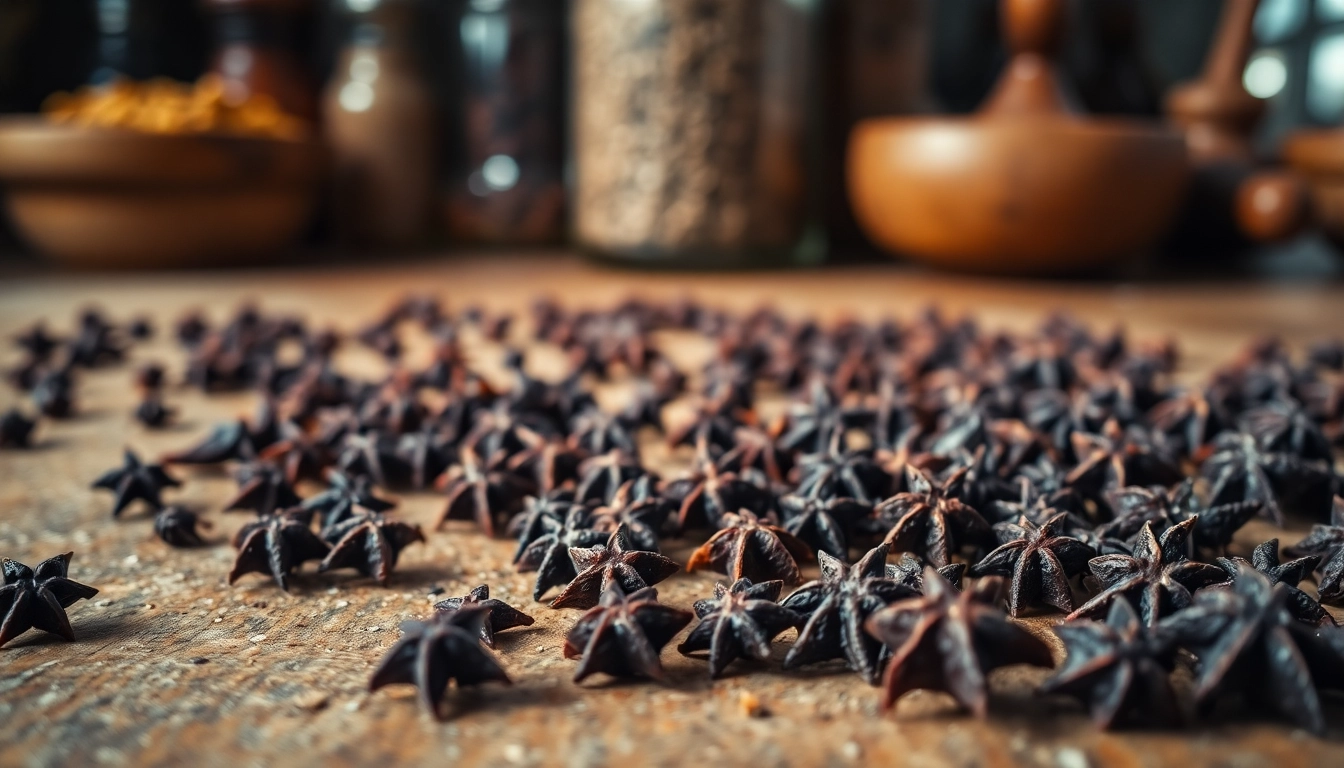Understanding Cloves: An Introduction
Cloves, the aromatic flower buds of the Syzygium aromaticum tree, have been celebrated for their robust flavor and health benefits throughout history. Native to the Maluku Islands, or Moluccas, in Indonesia, these small, reddish-brown buds have found their way into kitchens and apothecaries around the world. As one of the most important spices in global cuisine, cloves are not only valued for their culinary uses but also for their medicinal properties. To truly appreciate the depth of cloves’ impact, we delve into their origins, flavor profiles, health benefits, and culinary applications. You can explore the best options for acquiring high-quality cloves by visiting Cloves.
What Are Cloves and Their Origins?
Cloves are harvested from the flower buds of the clove tree, which belong to the family Myrtaceae. These buds are picked when they are still unopened and have a unique, strong aroma that intensifies when dried. Cloves grow in tropical climates, with their primary production in countries like Indonesia, Madagascar, and Sri Lanka. The spice has a rich history, dating back to ancient times when it was a prized trade commodity. It was even known to be used in traditional Chinese medicine and was a significant export during the spice trade era.
Flavor Profile and Culinary Uses of Cloves
Cloves possess a bold, sweet, and slightly bitter flavor profile characterized by their warm and aromatic qualities. This makes them a versatile ingredient in both savory and sweet dishes. The primary compound responsible for their intense flavor is eugenol, which contributes to their distinctive taste. In cooking, cloves can be used whole or ground, with the former often appearing in spice blends like garam masala and the latter in baked goods like gingerbread and spiced cakes. Their adaptability extends beyond food preparation; cloves are also utilized in beverages such as chai tea and mulled wine, providing a cozy depth to these seasonal favorites.
Cloves in Global Cuisine
Cloves are a staple in many culinary traditions around the world. In Indian cuisine, they are essential for creating complex spice mixes used in curries and biryanis. Middle Eastern dishes often incorporate cloves in rice and meat preparations, while Western cuisine features them in potpourris, pumpkin pies, and hams during festive occasions. The widespread use of cloves across various cuisines highlights their unique ability to enhance the flavors of both sweet and savory dishes.
Health Benefits of Cloves You Should Know
Beyond their culinary applications, cloves offer a host of health benefits recognized by both traditional and modern medicine. Rich in antioxidants and essential nutrients, cloves play a vital role in supporting health and wellness.
Nutritional Composition of Cloves
Cloves are densely packed with essential nutrients, including vitamins, minerals, and antioxidants. Key components include:
- Vitamins: Particularly high in vitamin K, which plays a critical role in blood clotting and bone health.
- Minerals: Manganese, calcium, magnesium, and phosphorus all contribute to various bodily functions.
- Antioxidants: Cloves contain powerful antioxidants that help combat oxidative stress and inflammation.
Medicinal Uses and Health Benefits
Research has highlighted several potential health benefits of cloves, which include:
- Anti-inflammatory Properties: The eugenol in cloves may help reduce inflammation in the body, potentially benefiting conditions like arthritis.
- Digestive Support: Cloves are known to aid digestion and can alleviate issues such as bloating and gas.
- Oral Health: Clove oil is a common remedy for dental pain due to its natural analgesic and antibacterial properties.
- Blood Sugar Regulation: Preliminary studies suggest that cloves may help improve insulin sensitivity, making them beneficial for blood sugar management.
Potential Risks and Considerations
While cloves have numerous health benefits, there are also some risks to be aware of. High doses of clove oil can lead to irritation of the mucous membranes or gastrointestinal distress. Additionally, because cloves can affect blood clotting, those on anticoagulant medications should exercise caution and consult with a healthcare provider before incorporating significant amounts of cloves into their diet.
How to Use Cloves in Cooking
Incorporating cloves into your cooking can elevate your dishes with deep, complex flavors. Here’s how to use this powerful spice effectively.
Recipes Featuring Cloves
Here are several delectable recipes that can bring out the best in cloves:
- Spiced Apple Cider: Simmer apple cider with cloves, cinnamon sticks, and orange slices for a warming beverage.
- Clove-Infused Rice: Add whole cloves to your rice cooking water to impart a fragrant aroma and flavor.
- Molasses Cookies: Include ground cloves in cookie dough for a sweet-spicy treat.
Substituting Cloves in Dishes
If you find yourself out of cloves, a few substitutes can provide similar warmth and flavor. Consider using:
- Allspice: Provides a similar warm flavor profile.
- Cinnamon: While sweeter, cinnamon can work well in baked goods where cloves are often used.
- Nutmeg: Offers a warm undertone that can mimic the characteristics of cloves in certain savory dishes.
Storing and Preserving Cloves
To maintain the potency and flavor of cloves, proper storage is essential. Store cloves in an airtight container in a cool, dark place. Whole cloves will generally maintain their flavor longer than ground cloves, so it is advisable to use whole cloves whenever possible and grind them as needed.
Exploring Clove Oil: Uses and Benefits
Clove oil, derived from the buds of the clove tree, is popular in aromatherapy and home remedies due to its beneficial properties. Here’s a deep dive into its uses and benefits.
Clove Oil in Aromatherapy
Clove oil is esteemed in aromatherapy for its uplifting and invigorating qualities. Its rich scent can enhance mood, reduce stress, and promote mental clarity. A few drops of clove oil in a diffuser can create a warm atmosphere, especially during the colder months.
Topical Applications of Clove Oil
Due to its analgesic properties, clove oil is often used in topical applications. It can be mixed with carrier oils for massages, especially to relieve sore and tense muscles. Additionally, it is frequently combined into herbal balms for pain relief.
Safety Precautions with Clove Oil
As with any essential oil, caution is essential when using clove oil. It should be diluted with a carrier oil before topical application to reduce the risk of skin irritation. Additionally, clove oil should be kept away from the eyes and mucous membranes. Pregnant women and individuals with certain health conditions should consult a healthcare professional before use.
Finding Quality Cloves: A Buying Guide
To fully benefit from the richness of cloves, it’s crucial to choose high-quality products. Here’s what to consider when purchasing cloves.
What to Look For When Buying Cloves
When buying cloves, consider the following factors:
- Origin: High-quality cloves are usually sourced from Indonesia or Madagascar where they are grown under optimal conditions.
- Appearance: Whole cloves should be plump, and dark reddish-brown in color, with a strong aroma.
- Packaging: Choose cloves in airtight packaging to ensure freshness and protection against moisture.
Where to Purchase Quality Cloves
Cloves can be purchased at local grocery stores, specialty spice shops, or online retailers. Buying in bulk can often yield better prices and fresher products. Look for reputable brands with positive reviews to ensure you’re getting a high-quality product.
Best Brands for Whole Cloves
Some well-regarded brands in the spice market known for their quality whole cloves include:
- McCormick: A widely recognized brand that ensures quality and freshness in their spices.
- Simply Organic: Known for its organic certification, offering ethically sourced spices.
- Frontier Co-op: Offers a variety of organic spices, including whole cloves, with sustainable practices.
By following these guidelines on the use, benefits, and procurement of cloves, you can enhance your culinary endeavors and tap into the numerous health benefits this remarkable spice offers.



